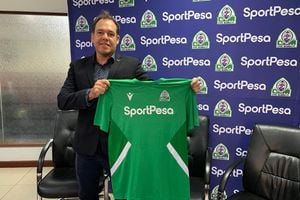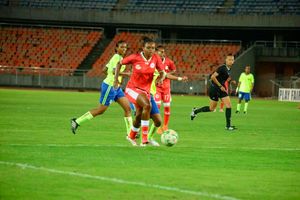
A packed Benjamin Mkapa Stadium in Dar es Salaam during the Yanga Pre-Season celebrations on August 30, 2020.
Every cloud has a silver lining. Since their formation in 1935 Young Africans, or Yanga, have, by any measure, grown to become Tanzania’s most decorated club.
Their Dar derby against archrivals Simba SC is one of the most anticipated club fixture in the region, and indeed the continent.
But something happened in 2016 that almost saw the demise of the beloved Jangwani club before they rose like a phoenix from the ashes to the new, refreshing heights they enjoy today.
Financial troubles struck, leaving the team unable to pay salaries or attract top talent. The club's once-bright future seemed to dim. For years, Timu ya Wananchi, or the People’s Team, as they are affectionately known, had depended on the financial backing of the late business tycoon Yusuf Manji.
Manji, once a prominent figure in Dar es Salaam’s business community and recognised as one of Africa's wealthiest individuals, faced a series of legal challenges around 2016. That tarnished his reputation, sort of.
Before his challenges, the founder of Quality Group Limited (QGL) had built an impressive $700 million conglomerate with interests in diverse sectors, such as automobiles, real estate, facilities, and export trade.
But then authorities started looking into his taxes, which they said he had evaded, as well as claims of unethical business practices, including a controversial military uniform supply tender. This occurred when the former head of state John Magufuli had pledged to eradicate corruption in Tanzania.
The government initiated audits and investigations into the financial dealings of various companies, including Manji's. Following these audits, several of his companies were implicated in wrongdoing, leading the Tanzania Revenue Authority (TRA) to shut down one of his farming operations and demand over $4.5 million in unpaid taxes.
That cut a major vein to Yanga’s survival. But it also showed just how dangerous it was to rely heavily on an individual’s generosity. On and off the field, Tanzania’s oldest club looked like a pale shadow of the side that had won 27 league titles and had even fashioned a fearsome reputation on the continent.
Deus Kaseke, who was with the team during that period, has not forgotten those long bus trips or the uncertainty about whether they would get their salaries at the end of each month.
Philemon Ntahilaja, a former chairman of Yanga Family, the team's fundraising committee, recalls a time when the club was struggling financially, barely managing to gather enough money to cover matchday expenses.
“It was unsustainable,” he told The EastAfrican last week in Dar es Salaam. “The club was living on donations, and we had to call fans to hire transport, air tickets, and sign players. I happened to be the chairman of the Yanga Family, whose responsibility was to solicit funds,” he said in an interview from Tanzania’s commercial capital where Yanga is based.
Young Africans' president, Hersi Ally Said, whose love for the club blossomed in 1992, initiated by his dad, reflects on the challenging period. Perhaps the sharpest dagger in his heart was watching Yanga’s Kariakoo rivals, Simba SC, win four league championships on the trot when they could barely keep the lights on at Jangwani Street.
"Our chairman (Manji), the guy who was financing the club, ran into problems in 2016,” he told The EastAfrican.
“It was very difficult because the club couldn’t manage even the salaries of the players.” The club's struggles were palpable, and the impact on the team was devastating.
But amidst the darkness, a glimmer of hope emerged.
In 2020, a group of companies called GSM stepped in, determined to restore Yanga to its former glory. Said, then a director of investment at GSM, explains:
“We came up with a project called Transformation, a new system of operation,” Said said.
This ambitious project aimed to rebuild the club from the ground up.
A key part of this transformation involved seeking guidance from one of the world's top football leagues, La Liga of Spain.
GSM, with Hersi Said as the vice chair of the committee, reached out to La Liga for expertise and support. The partnership proved fruitful, as La Liga provided valuable insights and assistance.
“We signed an agreement to produce kits for the club. It solved two issues—they got money, and it resolved the kit issue. We did a good launch,” Said explains. Whenever they launch a new kit, Yanga is easily able to sell 300,000 pieces on the first day at a cost of US$27 per piece, the official claims.
“We understood that it’s not business if your partner is not doing well. So, we decided to do more for the club and signed players.
“The next thing we did was change the place they camped before games. We gave them a good hotel. We secured a contract for a proper training ground,” explains the revered administrator whose professional calling was first an engineer.
Ghanaian winger Bernard Morrison was the inaugural signing among four new additions for Yanga under their newly appointed Belgian coach, Luc Eymael, in January 2020.
GSM's plan to revitalise Yanga consisted of three phases. In each phase, the fans – the most important and dedicated group involved – would play a vital part.
“In phase one, we had to relook the club ownership. We chose a model where the club became 51 per cent owned by the public and 49 per cent private. In phase two, we set up a company – Young Africans Sports Company, with a board of the club – 51 public and 49 private in terms of composition. Phase three was fan engagement. We devised a fan engagement model through which they could register and pay registration fees,” the Yanga president explains.
The era of the club's finances depending solely on one individual was now finished. Moving forward, the fans would have a voice in the financial stability of their beloved team.
“Fans paid an annual subscription of US$5 and members US$12,” said Hassan Bumbuli, the former Yanga head of media. In the first six months, the Jangwani giants collected US$ 500,000 from fans’ membership subscriptions. Currently, the team has over 100,000 registered members.
With Hersi and his team managing affairs off the field, Yanga's fortunes began to change, even on the pitch.
The 2020/21 season saw them finish second in the league, reach a cup final, and claim victory in the Mapinduzi Cup.
The club signed 16 players ahead of the 2021/22 season, including Mali national team goalkeeper Djigui Diarra and Congolese goal poacher Fiston Mayele.
The club hierarchy made the right decisions, and stakeholders, including the players, started feeling the positive effects of Eng Hersi's changes.
“Things have since changed since GSM and Eng. Hersi came on board,” says a hotel waiter, Idd Selemani, in Dar es Salaam.
“They brought in top international players like Mayele, the Mali national team goalkeeper (Diarra) and Khalid Aucho (Uganda national team player).”
Mayele was sold to cash rich Egyptian giants Pyramids for a fee of about US$800,000 at the start of the 2023/24 season.
The 2021/22 season saw Eng Hersi’s vision spring into full life. It was the season that Yanga joined the likes of Arsenal, AC Milan, Juventus, Celtics and Rangers as part of a select cast of elite sides around the globe that have managed to go through a season unbeaten.
In addition, Yanga clinched a historic treble, crowning a year in which they brought Simba’s dominance to a screeching halt.
In May 2024, they won their 30th league title, adding to the FA Cup. Yanga also reached the CAF Champions League quarter-final.
South Africa’s first-ever player to turn out for the Dar es Salaam giants, Mahlatse ‘Skudu’ Makudubela, notes that the club has undergone a remarkable transformation, overcoming financial difficulties and lacklustre performances on the pitch.
He credits Eng. Hersi for “successfully creating a team that has achieved everything possible domestically and remains eager for further triumphs”.
Sponsors are practically falling over themselves in their eagerness to fund the team.
At the end of the 2023/24 season, SportPesa Tanzania handed over a bonus of US$200,000 to the club. SportPesa is the prominent shirt sponsor for Young Africans. Other sponsors include Haier, the world's number one Major Appliance Brand; GSM, the kit manufacturer; and Whizmo, a peer-to-peer mobile money platform.
Azam TV compensates Young Africans for the media rights associated with the club. The National Insurance Company, a leading provider of insurance and risk management services in the East African country, is another club backer. Yanga also has national airline Air Tanzania and Silver Investments, among several other partners.
“It’s one of the best clubs I’ve ever played for in my career. A dressing room full of international players. The fan base was massive everywhere we went. In fact, in every away game, we had more fans as Yanga,” says Makudubela, formerly with South African sides Mamelodi Sundowns and Orlando Pirates.
The 34-year-old expressed his appreciation for the excellent care he received at the club. He highlighted how the team was incentivised, particularly for important matches and CAF competitions, which significantly boosted morale and fostered a sense of camaraderie.
“We were looked after very well. They incentivised us, especially in the big games and CAF, and it went a long way. It created a nice camaraderie because when you were on the bench, you knew the person on the field was fighting for you. We pushed each other to do well.”
Yanga have experienced such a dramatic transformation, evolving from a club in dire financial straits just a few years ago to one that every young footballer in Tanzania and beyond aspires to represent.







